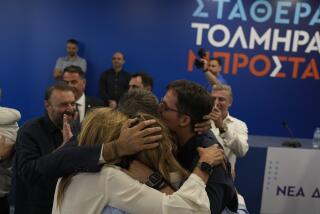Turkish Cypriot Election Yields a Deadlock
- Share via
NICOSIA, Cyprus — Proponents and opponents of a plan to unify Cyprus appeared nearly evenly matched after parliamentary elections Sunday in the Turkish-controlled north. The outcome dashed hopes of an early resolution of the decades-old dispute between Turkish and Greek Cypriots. With almost all of the votes counted, a coalition of three parties favoring unification had a bare majority while the coalition of parties rejecting a U.N.-sponsored plan, led by veteran Turkish Cypriot leader Rauf R. Denktash, had about 45% of the vote. Because of how the districts are structured, the sides were expected to evenly divide the 50 seats in the assembly.
Cyprus has been split between a Greek south and a Turkish north since Turkish troops invaded in 1974 to counter a short-lived coup mounted by Greek Cypriot nationalists and backed by Athens; the subsequent fighting killed about 3,000 people.
“Forming a government will be extremely difficult,” said Mehmet Ali Talat, who heads the leading Turkish Cypriot opposition Republican Turkish Party, which defeated the ruling National Unity Party for the first time.
“We have failed to decisively swing voters in favor of peace,” he said at a news conference shortly after the results were announced.
Another pro-peace opposition party and a right-wing group led by Denktash’s son cemented the deadlock by winning about 13% and 12% of the votes, respectively.
The proposed peace plan was designed to allow both parts of Cyprus to join the European Union by creating a loose federal state that gives each ethnic community broad powers.
The EU has said it would allow the Greek portion to join in the spring.
But with the deadlock on the Turkish-held side, it is unclear what the next step will be in trying to resolve the fate of the island.
A clear opposition victory in the Turkish-controlled north would have strengthened the hand of Turkey’s reformist prime minister, Recep Tayyip Erdogan, as he seeks to overcome resistance from military leaders at home.
Those leaders, along with Denktash, oppose the United Nations peace plan, arguing that it would lead to Greek control over the island.
The outcome will also likely complicate Turkey’s bid to gain entry into the EU, whose leaders have told Ankara that its membership cannot be considered until the Cyprus issue is resolved.
“My future is black, very black now,” said Cafer Yoncu, a college student standing outside Talat’s headquarters.
“The will of the Turkish Cypriot people has not been reflected in this election.”
Like many, Yoncu blamed the outcome on about 40,000 Turkish settlers who also cast ballots Sunday.
Mainland Turks brought in as part of a Turkish policy to increase the number of ethnic Turks on the island now account for about half of the more than 200,000 people in the breakaway republic of northern Cyprus, which is recognized only by Turkey.
A majority of the settlers, fearing that they will be kicked out if the island is reunited under the U.N. plan and the Turkish Cypriots join the EU together with the Greek Cypriots, are believed to have voted for the ruling parties.
Turkish Cypriots whose properties would be returned to Greek islanders under the plan did so as well.
“Fear won over peace,” said Bulent Aliriza, director of the Turkey Project at the Washington-based Center for Strategic and International Studies.
More to Read
Sign up for Essential California
The most important California stories and recommendations in your inbox every morning.
You may occasionally receive promotional content from the Los Angeles Times.













